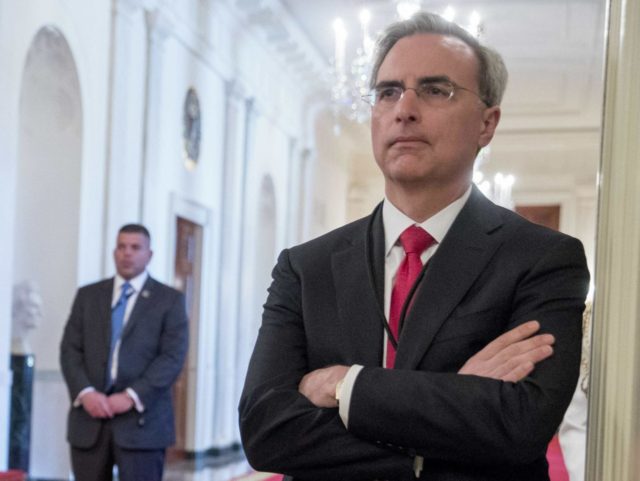White House Counsel Pat Cipollone wrote a five-page letter to House Judiciary Chairman Jerrold Nadler (D-NY) on Sunday, rejecting participation in what Cipollone called a “baseless and highly partisan” impeachment inquiry.
Nadler had given the president and his lawyers until 6:00 p.m. EST to respond to a request to participate in the opening hearing of the Judiciary Committee’ inquiry on Wednesday, focusing on constitutional and legal issues. Democrats had prepared four witnesses, unnamed as of Sunday: three were reportedly in favor of impeachment. Separately, Nadler gave the White House a deadline of Friday, Dec. 6, to participate in the broader inquiry.
In his letter (via Politico), Cipollone said that the Democrats’ process “violates all past historical precedent, basic due process rights, and fundamental fairness.” He accused Democrats of deliberately scheduling the opening hearing during the president’s upcoming trip to the NATO Leaders Summit in London this week.
Cipollone further pointed out that the opening hearing would “include no fact witnesses at all,” and that neither the first nor subsequent hearings were clear about what witnesses would be called, or about what rights the president would be provided. (He reserved the right to respond to Nadler’s broader invitation by the Friday deadline.)
The White House counsel disputed Nadler’s claim to be acting in accordance with precedent set during the impeachment of President Bill Clinton, noting significant departures from procedures followed on that occasion:
Although your letter attempts to invoke precedent from the Clinton impeachment inquiry, you have completely ignored not only the process followed then, but all other historical precedent. For example, when the Judiciary Committee scheduled a similar hearing during the Clinton impeachment process, it allowed those questioning the witnesses two and-a-half weeks’ notice to prepare, and it scheduled the hearing on a date suggested by the President’s attorneys. Today, by contrast, you have afforded the President no scheduling input, no meaningful information, and so little time to prepare that you have effeetively denied the Administration a fair opportunity to participate.
…
Past inquiries … did not authorize one set of committees to conduct two rounds of hearings with witnesses (one round in secret and another in public) while prohibiting the President from any opportunity to participate. Nor did these past inquiries eontinue to deny those rights to the President even in a third round of hearings before yet another committee, the Judiciary Committee. Inother impeachment proceedings, the President’s counsel was not excluded from the hearings that took testimony from fact witnesses, nor was the President denied the right of cross examination during those hearings.
…
[I]n both of those proceedings,the minority party had co-equal subpoena authority. Here, by contrast, the ranking member of this Committee cannot force a vote on subpoenas that you choose to issue, but you can force committee votes on the ranking member’s subpoenas.
…
Lastly, what past impeachment proceedings make clear is that the Judiciary Committee must hear and assess evidence for itself.
Cipollone also argued that the use of the House Intelligence Committee for preliminary hearings violated the president’s due process rights, allowing chairman Rep. Adam Schiff (D-CA) to “concoct a false narrative”:
The President was not allowed to present evidence, to call witnesses, to cross examine witnesses, or even to see transcripts until weeks after testimony had been taken, and he was allowed absolutely no participation in the public hearings that followed. Further, witness requests made by Republicans were denied. In addition, certain questioning of the witnesses who did testify was censored by Democrats.
He added, further, that Nadler’s threat to take action if the White House continued to resist providing witnesses and documents — even on constitutional grounds — amounted to a total denial of procedural rights to the president.
Cipollone quoted Nadler’s own words to him, from the 1998 Clinton impeachment process, declaring that the Judiciary Committee could not simply receive a report from another committee, but should conduct its own inquiry, complete with witnesses. Again, he pointed out that it was not clear whether, and which, witnesses would be called.
While declaring that “[i]t is too late to cure the profound procedural deficiencies that have tainted this entire inquiry,” Cipollone said that the administration remained open to participation if it were allowed to be involved “meaningfully,” including the ability to call witnesses that had thus far been refused. He invited Nadler to meet.
Joel B. Pollak is Senior Editor-at-Large at Breitbart News. He earned an A.B. in Social Studies and Environmental Science and Public Policy from Harvard College, and a J.D. from Harvard Law School. He is a winner of the 2018 Robert Novak Journalism Alumni Fellowship. He is also the co-author of How Trump Won: The Inside Story of a Revolution, which is available from Regnery. Follow him on Twitter at @joelpollak.

COMMENTS
Please let us know if you're having issues with commenting.